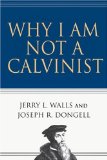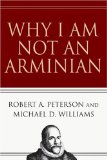Why I Am Not an Arminian. By Robert A. Peterson and Michael D. Williams. Downers Grove: InterVarsity Press, 2004. 224 pp. Paper. $15.00.
Why I Am Not a Calvinist. By Jerry L. Walls and Joseph R. Dongell. Downers Grove: InterVarsity Press, 2004. 230 pp. Paper. $15.00.

As we can see from the titles of what at first glance appears to be companion volumes, the great debate between Calvinism and Arminianism continues. “Debate” books, in which two or more authors contribute their viewpoint and then critique each of the other authors’ views, have become popular in recent years, as evidenced by the popularity of Zondervan’s “Counterpoint Series” (Four Views on Hell, Four Views on Eternal Security, etc.). There have even been “debate” books on the subject of Calvinism, like Predestination and Free Will: Four Views of Divine Sovereignty and Human Freedom (InterVarsity, 1986), and more recently, Debating Calvinism: Five Points, Two Views(Multnomah, 2004).
Although they appear to be in the “debate” genre, these two new volumes from InterVarsity Press are notin that format, and can be read independently. Each book is written against the other position, but not in the form of a debate between the two sets of authors. In fact, there is no interaction between the two books at all. And although on the outside the books are about the same size and share the same cover design, and on the inside have similar formatting, the books are completely different in their approach.
Why I Am Not an Arminian is, of course, written by two Calvinists, Robert Peterson and Michael Williams, both professors of systematic theology at a Calvinist school, Covenant Theological Seminary in St. Louis, Missouri. Peterson has previously authored Calvin and the Atonement (Christian Focus, 1999). Their book is seamless; that is, there is nothing in the book which indicates that a particular chapter or section was written by one author or the other.
Why I Am Not a Calvinist is likewise written by two Arminians, Jerry Walls and Joseph Dongell, both professors at an Arminian school, Asbury Theological Seminary in Wilmore, Kentucky. Walls is a professor of philosophy of religion while Dongell is a professor of biblical studies. Walls has previously contributed a chapter to The Grace of God and the Will of Man: A Case for Arminianism (Zondervan, 1995). Their dual authorship is more obvious, as evidenced by awkward phrases like “though I (Joe) disagree…” (p. 45) that are found in the text and the footnotes. In fact, the author’s appear to disagree on two key points: the nature of foreknowledge and the knowledge of God.
Because I am neither a Calvinist nor an Arminian, I can recommend both of these books, but not equally or in their entirety.
Why I Am Not a Calvinist begins with a weak Introduction and then falters briefly before really getting into the problems of Calvinism. Walls and Dongell maintain in their Introduction that Calvinists err by framing the debate in terms of the concept of God’s sovereignty and man’s ability. They insist that the fundamental dispute should rather be about God’s character. Their aim is to prove that “Calvinism distorts the biblical picture of God and fails in other crucial ways that show its inadequacy as a theological system” (p. 8). I think they make a grave mistake by dismissing the details of the historical dispute between Calvinism and Arminianism as “not our concern here” (p. 13). And in their much too brief overview of the Five Points of Calvinism, their claim that “recently a number of Calvinists have expressed reservations, and in some cases outright disagreement, with the traditional notion of limited atonement” (p. 11) is certainly incorrect. There is nothing recent about these reservations and disagreements at all.
The first chapter, “Approaching the Bible,” has some useful information, but can be skipped since it contains very little information about either Calvinism or Arminianism. The placement of this chapter is unfortunate because it has the potential of causing the reader to lose interest. The title of the second chapter, “Engaging the Bible,” looks at “the three strongest scriptural arguments for Calvinist theology: the sovereign nature of God, the gracious nature of salvation and the reality of divine election” (p. 47). The authors present the Calvinist perspective on these issues followed by an Arminian response. This chapter is really the only place in the book that contains any Scripture exegesis.
It is really chapters 3 and 4 that make this book worth reading and recommending. Chapter 3 (“Calvinism and the Nature of Human Freedom”) contains a solid philosophical discussion of hard determinism, libertarian freedom, and soft determinism (compatibilism). The authors argue that “there are large stretches of Scripture that are hard to make sense of if humans aren’t free in the libertarian sense of the word” (p. 117).
Chapter 4 (“Calvinism and Divine Sovereignty”) is likewise an examination of three views of sovereignty and foreknowledge: Calvinism, Molinism, and Openness. Calvinists, of course, believe that God knows every future event because he decreed every future event. Evil is explained away, however, by saying that God merely permits it. Molinism, named after Luis de Molina (1535-1600), is the view that God has middle knowledge, that is, “what all possible created free wills would do in all possible circumstances and situations that are not and never will be” (p. 135). God knows everything that will be, might be, and could have been. The “open view of God,” as opposed to the traditional view, holds that “libertarian freedom and infallible foreknowledge are incompatible” (p. 143). Proponents of the Openness view (like, apparently, Joseph Dongell) “hold that it is impossible in principle for future undetermined free actions to be known with certainty” (p. 142). The authors conclude that although “God’s sovereignty and providential control of our world are surely matters that exceed our full understanding,” the Calvinist explanation “poses particularly severe difficulties, especially with respect to the problem of evil” (p. 152).
In the last two chapters, Walls and Dongell briefly explore a variety of topics like the genuineness of the offer of salvation, the sincerity of divine compassion, guilt and the Fall, evangelism, the fate of the unevangelized, assurance, and the problem of evil. They conclude in chapter 5 (“Calvinism and Consistency”) that in Calvinism can be found “inconsistency, confusion or misleading language where human freedom and responsibility are concerned” (p. 184), and in chapter 6 (“Calvinism and the Christian Life”) that “Calvinism is beset with practical inconsistencies that mirror its logical contradictions” (p. 215).
At first glance, Why I Am Not an Arminian appears to be different from the typical book on Calvinism that focuses on the Five Points of Calvinism. Appearances, however, are deceiving. Besides the Introduction, which is chapter 1, there are two chapters devoted to history, but six chapters dedicated to expounding Calvinism. Five of these chapters relate explicitly to one of the five points of Calvinism. Peterson and Williams acknowledge in their introduction that they “would have preferred to write a biblical presentation of Calvinism, a Why I Am a Calvinist book” (p. 13). They go on to say that as Calvinists they will put forth their arguments against Arminianism, but: “To be honest, our true goal is to commend and defend Calvinism. We believe that we are obligated to say this because the answer to the question ‘Why am I not an Arminian?’ is that we are Calvinists” (p. 13). So, unlike Why I Am Not a Calvinist, this companion volume is not true to its title.
The two chapters devoted to history (chapter 2—“Augustine and Pelagius” and chapter 5—“Arminius and the Synod of Dort”) are well-written and crucial to understanding the issues in the Calvinist/Arminian debate. They are profitable whichever theological position one takes. This gives the book a major advantage over the companion volume, Why I Am Not a Calvinist. Lacking, however, is historical information about John Calvin himself, other than the unfortunate blunder that Theodore Beza was Calvin’s son-in-law (p. 93). There is a problem, though, with putting too much emphasis on the Augustine/Pelagius controversy. Unlike the majority of Calvinists, the authors do admit that “the allegation that Arminianism is Pelagian is unfortunate and indeed unwarranted” (p. 39), but the seed is sown nevertheless that anything opposed to Calvinism is heretical.
Following the chapter on Augustine and Pelagius, there are chapters on predestination and perseverance. Here we find the same old Calvinistic arguments that one might find in a standard work like Loraine Boettner’s The Reformed Doctrine of Predestination. Of particular note is the fact that in the chapter on perseverance, the authors begin by showing from Scripture how believers are preserved by God. It is only after eleven pages of using the terms preserve, preserves, and preservation that they introduce the concept of perseverance. But then they sound like Arminians when they write, “Arminians and Calvinists agree that professed Christians must continue to the end in three areas if they are to be saved: believing the gospel, loving Christ and other believers, and living godly lives” (p. 77).
Following the chapter on Arminius and the Synod of Dort, there are chapters on freedom, inability, grace, and atonement. Naturally, God’s sovereignty is redefined as “divine foreordination” (p. 136), God’s drawing is salvation (p. 167), God’s grace is irresistible (p. 175), and God’s regeneration results in saving faith (p. 189). On John 3:16, it was refreshing to see that the authors, who otherwise have impeccable Calvinist credentials, “reject attempts to limit the meaning of ‘world’ here to ‘the world of the elect’” (p. 179). They further acknowledge that “Calvinists have not always argued well for limited atonement” (p. 202), and express their embarrassment “that at times Reformed Christians have not been as zealous as others to propagate the gospel” (p. 210). The authors’ criticisms of Arminians for rejecting the idea of substitutionary atonement are right on.
Although each of these books contains material that I can unequivocally recommend, they both suffer from the same underlying problem: The authors assume that one must be either a Calvinist or an Arminian. Neither side recognizes a middle ground that refuses to be identified with either position. Typical is this remark by Walls and Dongell: “Those who hold to eternal security while rejecting the middle three points are not truly Calvinists but are rather a sort of Calvinist-Arminian hybrid” (p. 13).
The debate between Calvinism and Arminianism is one that will last until the end of time. Although these new volumes contain ammunition that each side can use against the other, I see these books as more likely to further cement Calvinists and Arminians in their respective views.
Laurence M. Vance
Vance Publications
Pensacola, FL

